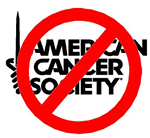It is not just wired bras that have been linked with breast cancer - it is all bras.
http://www.brafree.org/
The link shows studies that show the link:
STUDIES THAT SUPPORT THE BRA/CANCER LINK:
If you want the truth of anything, follow the money. Who gets to gain from cancer? I only wear them when I am going somewhere - not shopping. I am not willing to take any risks with my already fragile health condition.
http://www.brafree.org/
Does wearing constrictive bras for long periods of time daily contribute to breast cancer?
It does, according to at least 5 research studies and numerous healthcare providers, including oncologists and MD’s. Even some lingerie manufacturers have developed new bra designs hoping to minimize lymphatic constriction and thereby help prevent breast cancer, citing the bra-cancer theory for their patents.
But it doesn’t, according to the American Cancer Society and the Susan G. Komen Foundation, fund raising giants of the cancer detection and treatment world, which consider the link absurd and unworthy of serious consideration, and unquestionably assume that research showing a link must have some other explanation besides bras.
The link shows studies that show the link:
STUDIES THAT SUPPORT THE BRA/CANCER LINK:
- 1991 Harvard study (CC Hsieh, D Trichopoulos (1991). Breast size, handedness and breast cancer risk. European Journal of Cancer and Clinical Oncology 27(2):131-135.). This study found that, "Premenopausal women who do not wear bras had half the risk of breast cancer compared with bra users..."
- 1991-93 U.S. Bra and Breast Cancer Study by Singer and Grismaijer, published in Dressed To Kill: The Link Between Breast Cancer and Bras (Avery/Penguin Putnam, 1995; ISCD Press, 2005). Found that bra-free women have about the same incidence of breast cancer as men. 24/7 bra wearing increases incidence over 100 times that of a bra-free woman.
- Singer and Grismaijer did a follow-up study in Fiji, published in Get It Off! (ISCD Press, 2000). Found 24 case histories of breast cancer in a culture where half the women are bra-free. The women getting breast cancer were all wearing bras. Given women with the same genetics and diet and living in the same village, the ones getting breast disease were the ones wearing bras for work.
- A 2009 Chinese study (Zhang AQ, Xia JH, Wang Q, Li WP, Xu J, Chen ZY, Yang JM (2009). [Risk factors of breast cancer in women in Guangdong and the countermeasures]. In Chinese. Nan Fang Yi Ke Da Xue Xue Bao. 2009 Jul;29(7):1451-3.) found that NOT sleeping in a bra was protective against breast cancer, lowering the risk 60%.
- 2011 a study was published, in Spanish, confirming that bras are causing breast disease and cancer. http://www.portalesmedicos.com/publ...ientes-que-acuden-a-la-consulta-de-mastologia - It found that underwired and push-up bras are the most harmful, but any bra that leaves red marks or indentations may cause disease.
If you want the truth of anything, follow the money. Who gets to gain from cancer? I only wear them when I am going somewhere - not shopping. I am not willing to take any risks with my already fragile health condition.
